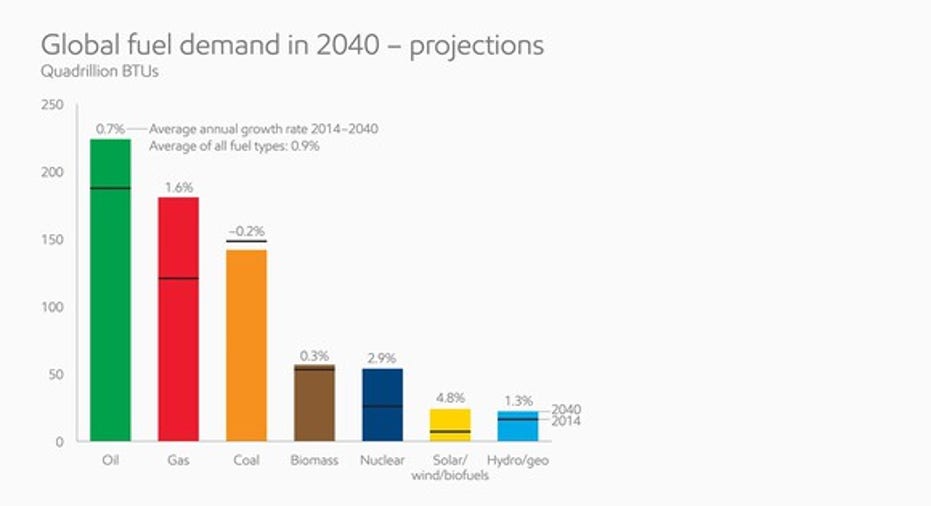3 Reasons to Love Energy Stocks

Image source: Getty Images.
Investors often overlook energy stocks. The sector is not known for booming growth like tech, nor are energy companies household names like many consumer-facing companies. However, despite their shortcomings, energy stocks have a lot to offer. Here are three reasons to love energy stocks.
1. Owning energy stocks can offset personal energy costs
Each month more than $100 gets plucked out of my checking account and deposited into the account of SCANA Corporation subsidiary South Carolina Electric & Gas to pay for my home's energy usage. I am one of over a million customers who routinely pay a SCANA subsidiary to deliver energy. Over the years those recurring income streams have generated substantial wealth for SCANA's investors:
Because of the wealth-generating ability of energy companies, investors canbenefit from owning energy stocks by using them to offset personal energy expenses. By investing in a utility, customers can offset some of their home energy costs via the wealth generated by that entity. The same could be true for offsetting gasoline costs by investing in an oil and gas producer, or a refining and marketing company.
2. Energy stocks provide pretty decent passive income
Anotherreason to love energy stocks is the passive income streams these companies often generate. To use SCANA as an example again: It has paid a dividend to its investors for 265 consecutive quarters, growing its payout in 61 of the last 65 years. Further, with plans to expand its earnings stream by 4% to 6% annually over the next three to five years, that payout will likely continue to grow. That's a pretty nice passive income stream.
While some investors might loathe the idea of owning a carbon-emitting utility, thereare plenty of green ideas out there for stock portfolios. Brookfield Renewable Partners , for example, is one of the largest pure-play renewable power platforms in the world. Brookfield Renewable Partners generates more than 10,000 megawatts of clean energy from its hydropower plants and wind farms, which is enough energy to power 4 million homes. Those assets not only generate a relatively steady supply of renewable power, but they also provide a steady stream of cash flow to Brookfield Renewable Partners. Furthermore, because of its pass-through corporate structure, the company sends the bulk of that cash flow to investors. It is a pretty nice payout, with the company's distribution currently yielding more than 6%. That passive income stream would make any investor green with envy.
3. The energy industry is still growing
Because its roots go back hundreds of years, the energy sector is not viewed as a growth industry. Further, due to the rise of renewables, many investors believe that fossil-fuel demand is on the decline. Those views could not be farther from the truth.
It is true that renewable-energy demand growth is expected to be much stronger than demand growth for fossil fuels. According to ExxonMobil's outlook for energy, demand for renewables is expected to grow by 4.8% per year through 2040, compared to just 0.7% annual demand growth for oil and 1.6% annual demand growth for natural gas. That said, the combined growth for those two fossil fuels far outweighs the growth of renewables on an absolute basis:
Image source: ExxonMobil.
This suggests there is plenty of long-term growth left for investors in the energy sector, even in the fossil-fuel space.
Investor takeaway
Too many investors miss out by not owning any energy stocks. Not only can these investments offset an investor's personal energy consumption, but energy stocks are also excellent for earning passive income and for capturing the sector's abundant future growth.This is why you should consider having at least one energy stock in your portfolio.
The article 3 Reasons to Love Energy Stocks originally appeared on Fool.com.
Matt DiLallo has no position in any stocks mentioned. The Motley Fool owns shares of ExxonMobil. Try any of our Foolish newsletter services free for 30 days. We Fools may not all hold the same opinions, but we all believe that considering a diverse range of insights makes us better investors. The Motley Fool has a disclosure policy.
Copyright 1995 - 2016 The Motley Fool, LLC. All rights reserved. The Motley Fool has a disclosure policy.



















